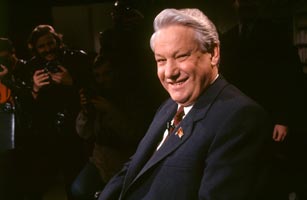
Russian politician Boris Yeltsin on the set of literary show Apostrophes
BORIS, BORIS! That Russian pun, prominently displayed on buttons and posters from Moscow to the icy reaches of Magadan, means "Boris, fight on!" No last name is needed, for to the Russian Federation's 147 million people there is only one Boris, and the great majority of them are rooting for him. Elected chairman of the Russian parliament in May, Boris Yeltsin oversees what is by far the largest, wealthiest and most populous of the Soviet Union's 15 republics. More to the point, Mikhail Gorbachev cannot make a decision without glancing over his shoulder at this onetime comrade turned rival who was bounced from the party's ruling Politburo in 1988 because he wanted reforms to move further, faster.
With his booming voice, Texas-style handshake and wide smile — not to mention his reputed fondness for the occasional drink — Yeltsin is dismissed by some Western analysts as the Huey Long of Soviet politics. The Moscow elite may wince at his unabashedly populist attacks against privilege. But to millions Yeltsin is a reckless street brawler ready to abandon caution in the interests of principle, a modern-day David who took on the establishment Goliath and won. Russians adore such underdog heroes. As a middle-aged fan passionately puts it, "I believe in no one but Yeltsin. He has suffered."
Thanks to the Russian leader's brand of people power, a dramatic realignment of forces took place in the Soviet Union during 1990. Gorbachev, once the prime force behind perestroika, found himself outmaneuvered and put on the defensive. While the Soviet President battled to hold his crumbling empire together, fending off separatist challenges from the Baltic republics and armed insurrection in the Caucasus, an invigorated Russia led by Yeltsin issued a brazen declaration of sovereignty in June. The genie was out of the bottle. According to Yeltsin, all the republics faced a common enemy: the centralized bureaucracy controlled by the Kremlin.
Whatever the issue, be it legalizing private property or drafting a new constitution, Yeltsin and the Russians have been setting the agenda for the entire country. In a legal war that has all the makings of a tennis grudge match, Russian parliamentarians pass measures asserting their republic's sovereignty, only to have Gorbachev strike them down. The Russians in turn countermand the presidential decrees, whereupon Gorbachev ignores them. Even when Gorbachev tries to join forces with Yeltsin, as he did in August to draft a 500-Day Plan for radical reform, the effort seems to dissolve almost immediately in mutual recrimination. Gorbachev needs to win Yeltsin's support for a new treaty of union, and the two will probably begin their mating dance again.
As confidence in the central government has evaporated, more and more Soviets are looking toward Moscow's "White House'" — the nickname for the headquarters of the Russian republic's government — to fill the leadership vacuum. The obvious candidate is Yeltsin, whether in league with Gorbachev or alone. The Russian leader likes to speak of his "credit of trust" with the people. To bring Russia safely through a winter of worsening food shortages, haunted by the danger of ethnic and labor unrest, Yeltsin may have to draw on every kopeck in that account. At the moment, he is the only Soviet politician with enough trust to draw upon.